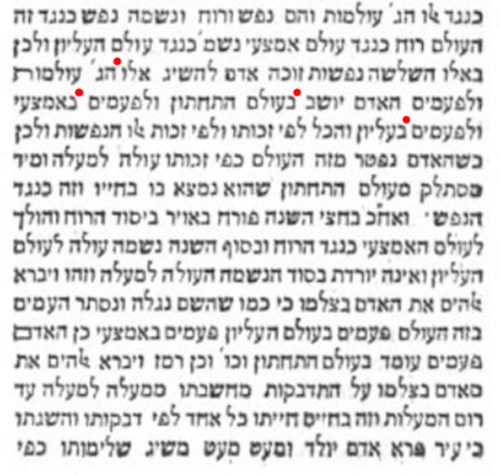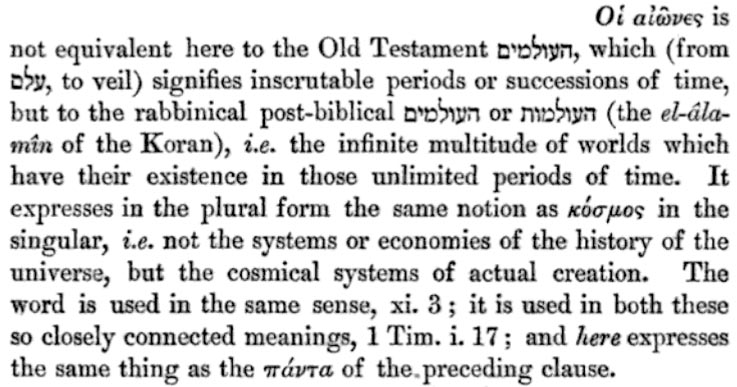Background
Hebrews 1:1-4 sets out a thesis that the rest of the book will unpack by way of encouraging its Christian audience to remain faithful.
The author's constant appeal to the Hebrew Scriptures accounts for the traditional title, "The Letter to the Hebrews", although the book doesn't look much like a letter, and it never identifies its audience as Jewish Christians explicitly. Still, given the content and argument of the book, it's easy to see why this assumption is made.
These very brief comments are a necessary backdrop to the answer to the specific question which follows.
Hebrews 1:2 text
The Greek of the Textus Receptus is provided in the question (δι᾽ οὗ καὶ τοὺς αἰῶνας ἐποίησεν), and it is a little different from the widely adopted critical text found in NA28 and UBS4:
1:2 ... δι᾽ οὗ καὶ ἐποίησεν τοὺς αἰῶνας
(Note the inverted word order, supported by 𝔓46, ℵ, A, B, and others. It really doesn't matter for this answer, though.)
The question is about αἰῶνας, or in its dictionary form, αἰών (aiōn). As the question notes, its "normal" meaning in the Greek NT (and LXX) is an "extent/period of time" (see especially under section II in that entry for biblical citations). There are some contexts and phrases which demand this meaning, but that's not the case in Hebrews 1:2, and the variety of translations is striking, especially extending to "universe, world, worlds", again as helpfully noted in the question.
What can account for this?
The Hebrew counterpart
About 380+ times in the Septuagint (pre-Christian Greek translation of the Hebrew scriptures), some form of αἰών translates עוֹלָם (ʿôlām), a very natural translation since they can both mean something like "eternity" ("a very, very, etc., long time").
This is almost exclusively the meaning that ʿôlām bears in the Hebrew Bible. However, by the time of the Midrashic literature, in rabbinic usage ʿôlām had taken on the sense of "existence, world" (from Marcus Jastrow's A Dictionary of the Targumim, etc., see the entry occupying most of the left column). Although it could still bear the sense of "eternity", this newer sense of "world" or "universe" became a very common usage.
Here's one example, chosen almost at random out of thousands. Solomon Schechter draws attention to the titles for God in relation to the world,1 noting among others: "the only [unique] one of the world". This is found in Bereshit/Genesis Rabbah 21, 5 which in Hebrew reads: יחידו של עולם (yechido shal 'olam),2 where ʿôlām is translated "world". (This is also very common in Jewish prayers, so not at all unusual.)
It should be starting to come clear where this discussion is going.
Back to Hebrews 1:2
The question about how to translate and understand αἰῶνας in Hebrews 1:2, then, turns on resolving this alternative: [a] is the word being used in its more typical sense of "eternity, long time", etc., OR, [b] is the (anonymous) author aware of and using the meaning of "world" familiar to us from later rabbinic writings, Jewish liturgy, etc., which would be emerging around the time of the composition of Hebrews (so not an anachronism!)?3 We need to factor in, too, the fact that the Greek form in Heb 1:2 is a plural form: does the translation need to reflect this plurality? or is it a stereotyped expression/idiom, in which the plural doesn't really bear semantic value?
That's a fair few questions hiding under the surface, then.
(1) In favour of [a], "ages" , we have the following:
- this is the "normal" meaning of aiōn; and
- ... that's about it.
Possibly, if one was reluctant to assign a Jewish-Christian provenance to Hebrews, one would argue that the author would probably be unfamiliar with this nuance/meaning. To my mind, that's a case of a conclusion constraining the evidence (and that's getting it backwards!).
(2) In favour of [b], "universe, world" (this counts as one option in my understanding):
- this is the only time, I think, that aiōn is the object the verb "to make" (ἐποίησεν) in the Septuagint or Greek New Testament: one thinks more readily of making some thing, than making "eternity";
- there is a parallel text in Hebrews 11:3 which suggests a consistent usage:
[ASV] By faith we understand that the worlds have been framed by the word of God, so that what is seen has not been made out of things which appear.
[UBS4] Πίστει νοοῦμεν κατηρτίσθαι τοὺς αἰῶνας ῥήματι θεοῦ, εἰς τὸ μὴ ἐκ φαινομένων τὸ βλεπόμενον γεγονέναι.
Here again, αἰῶνας is the object of another verb of making (κατηρτίσθαι, "restored, furnished"), and in which "time" would not make so much sense. And as it goes on to speak of things which are "seen", this would seem to require the "visible world", rather than "the ages", or elongated time of some kind. This, to my mind, is a very weighty piece of evidence.4, 5
And singular/plural? I'm not really sure.
Summary
My own sense is that the evidence inclines towards taking αἰῶνας to mean "world/worlds". It would take more time than I have just now to sort out the singular/plural. I only note for those interested that in the Jastrow entry on עוֹלָם linked above, the latter part of it is devoted to the nuances of the plural עוֹלָמִים glossed as "worlds".6
Bonus: One interesting outcome of this almost exclusively linguistic investigation, is that it could contribute to the modern debates about the Jewish context of the book, or at least its author. This conclusion, if persuasive, would add strength to the view that the writer of Hebrews was Jewish, or was in a Jewish milieu. Carrying that trajectory on to his audience would be a tad more tenuous, but an author using Greek αἰών to bear a nuance familiar from later Hebrew עוֹלָם is suggestive, at the least.
- Solomon Schechter, Aspects of Rabbinic Theology (New York: Schocken, 1961), p. 26. [It is remarkable that this edition of Schechter's valuable work, first published in 1909, is on Archive.org. Grab the PDF or one of the ebook formats!]
- The passage in translation (see for context): Midrash Rabbah: Genesis, p. 222 (near top of page).
- Hebrews is typically dated to early to mid 60s AD/CE, because the destruction of the Temple is nowhere reflected in its contents, despite ample opportunity -- indeed, necessity -- had the destruction taken place before its time of writing.
- It is noted by many commentators; conveniently, Marcus Dods in Expositor's Greek Testament, in vol. 4, p. 250. His discussion of this issue (takes up almost the whole left column of the page linked) is worth consulting.
- F.F. Bruce, The Epistle to the Hebrews (rev. edn; Grand Rapids: Eerdmans, 1990), p. 47 n. 17, cites LXX Exodus 15:18 (κύριος βασιλεύων τὸν αἰῶνα καὶ ἐπ᾽ αἰῶνα καὶ ἔτι, "The Lord reigns over the world, for ever and ever") as one of many examples of this usage. BDAG includes this as the third meaning in its αἰών entry, and includes 1 Tim 1:17 as a further example.
- This plural also occurs 7x in the Hebrew Bible, but normally taken by the Classical Hebrew lexicographers as a plural of intensity (see BDB).
Postscript
This discussion also explains why the majority of English versions (I haven't checked other modern languages) adopt a "non-temporal" meaning in translating Hebrews 1:2, as a glance at the Biblegateway listing demonstrates. It lists 55 translations, but once obvious duplicates are removed (e.g., NIVUK duplicating NIV), 32 out of 48 versions (or two-thirds) convey this understanding:
- KJ21: worlds
- ASV: worlds
- BRG: worlds
- CEB: world
- CJB: universe
- CEV: universe
- Darby: worlds
- DRA: world
- ERV: whole world
- ESV: world
- GNV: worlds
- HSCB: universe
- ICB: world
- ISV: universe
- Phillips: whole universe
- KJV: worlds
- LEB: world
- TLB: world and everything there is
- Mounce: material universse
- NOG: universe
- NABRE: universe
- NASB: world
- NCV: world
- NET: world
- NIV: universe
- NKJV: worlds
- NLV: world
- NRSV: worlds
- NTE: worlds
- RSV: world
- TLV: universe
- WYC: worlds




